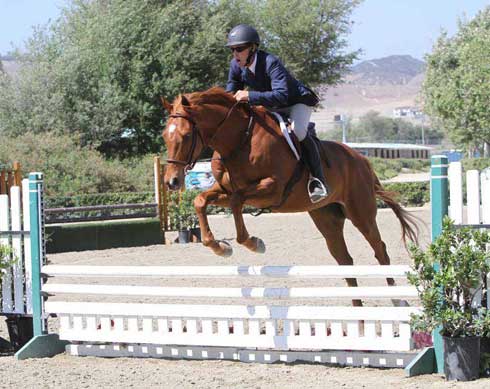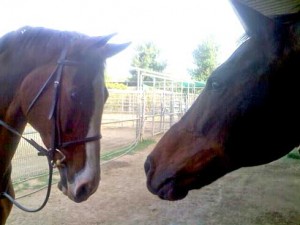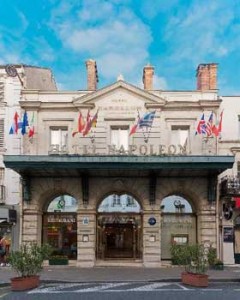Horse Economics
By Duncan McIntosh June 2, 2013
Author Duncan McIntosh rides Rockland, bred in the U.S. and a son of Smarty Jones. (Photo courtesy Edmonton Farms)
Can agrarian society and the suburbs mix?
The United States continues to fine-tune the formula for mixing horse sport with a post-industrial lifestyle. In the East, that integration has occurred more naturally: town and country versus ranch and coast (there’s something about having herds of cattle rumbling around that sets a tone for things hoofed).
But nationally, while we strive to make the economics of our sport work, the fact is the hunter/jumper community is so small it takes a lot to send a ripple through the larger equine world of Arabians, Thoroughbreds and Quarter Horses. The economic activity that surrounds each aspect of those breeds outstrips even the most vibrant sectors for hunters and jumpers.
Every category will have its booms and busts, but the fact is there is a $30-50K premium to any Warmblood show horse that has a brand on its side, which means it’s imported and somebody spent that much to bring it over here. We dumb-down hunter-jumpers a lot to make it user-friendly, but the bottom line is a year of hunter-jumper training for kids is the same as a year’s tuition in college, easily. That is not the case when you’re talking about riding Quarter Horses or Arabs. And because of huge number of participants those sports draw in, they get the big sponsorships we can’t touch.
There’s a breadth and depth of the measurement of involvement in equestrian sports that is multiplied by a factor of at least four and as much as 10 when you involve people in the breeding and production, because you involve not only the horses, but the farms the employees, the people who sell the tractors, for the first four or five years.
In Europe, there is a whole economy around the breeding and training of sport horses. They have many more horse shows and attract larger audiences. They have one show, Le Grande Semaine in Fountainebleu, where 2,000 of the elite young jumping horses go to prove themselves in championships organized by age groups starting at four. There are sales that run as adjunct to the competition.
I attended Le Grande Semaine in 1992 with my trainer, Rick Fancher, and as an aside, we stayed at the tiny little Hotel Napoleon, where the maître d’hôtel invited us to try what stands as singular best glass of wine I’ve ever had in my life – a Margaux Bordeaux that was almost warm. Reason enough to visit Fountainebleau! But it turns out the town bills itself as “le capital du cheval,” built around the magnificent chateau and race course at Longchamps where equine-themed events take place throughout the year.
The French are as fiercely proud of their horses as they are of their wine. The connection to the agricultural traditions has never been severed, and that’s why you have people like Richard Spooner earning good money to ride at horse shows in Europe. They originated “town and the country,” whereas in the U.S. we have largely embraced a suburban dream that is largely bereft of a farming ethic (although to some degree that microcosm has sprung up surrounding Arabians, Thoroughbreds and Quarterhorses, and as a result participation is much broader).

Ten years on, McIntosh got a mare he bred back into his training program. Here she is meeting her daddy. (Photo courtesy Edmonton Farms)
But like the saying goes, “bloom where you’re planted.” It’s always a virtue to make something out of what’s right in front of you. I’ve done some breeding. Today I was sitting on the daughter of my own stallion, and training her 10 years later, a Holsteiner-Selle Francaise cross.
I’m advocating a grass roots movement, right here. From a global standpoint, craftsmanship, production and agriculture are not lost arts, although are to some degree they’re being ignored. Tradition is an important part of our sport, and I think in the future these kinds of tradition will become even more valuable.
Visit Edmonton Farms on Facebook.
Short URL: https://theequestriannews.com/?p=15454



